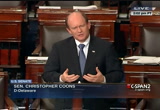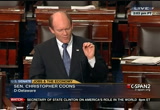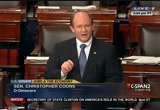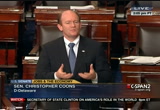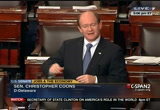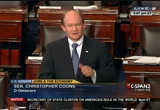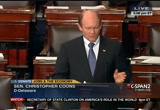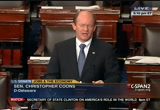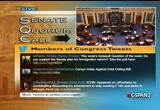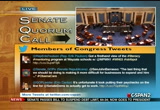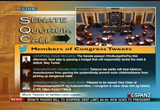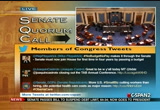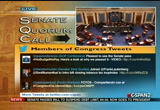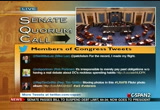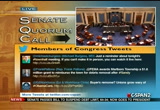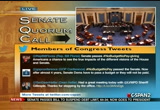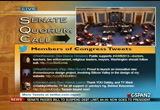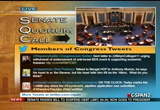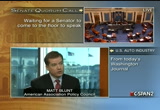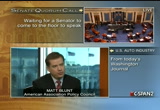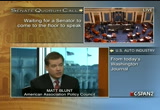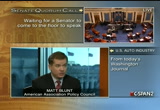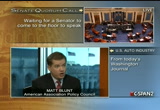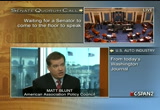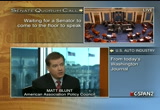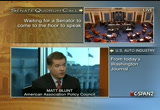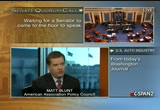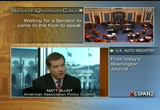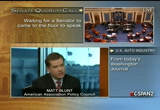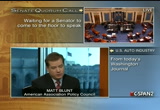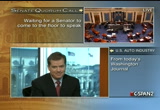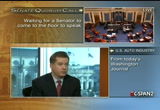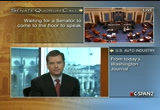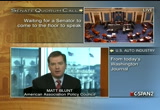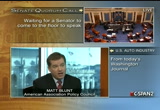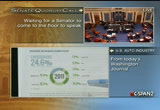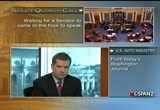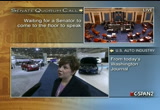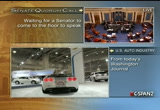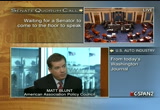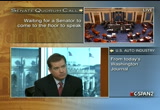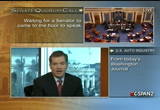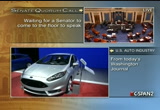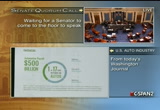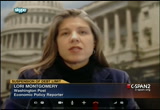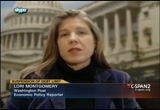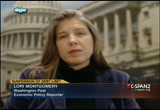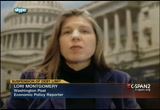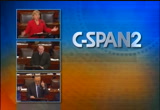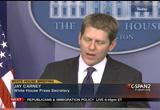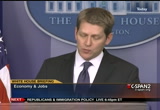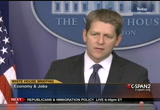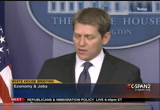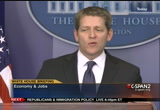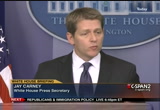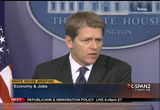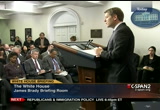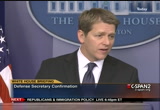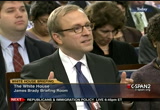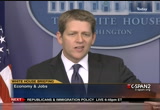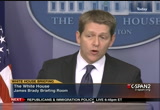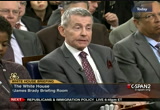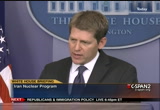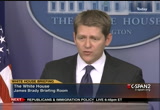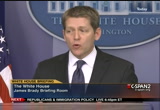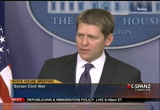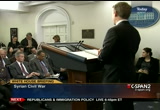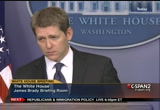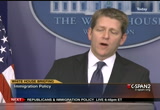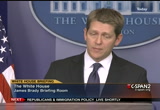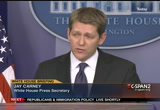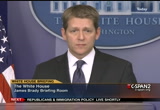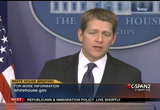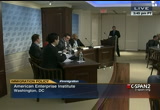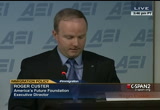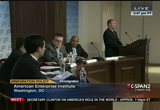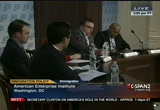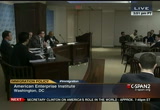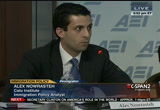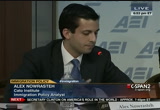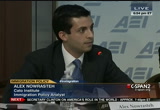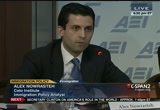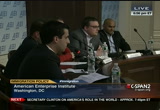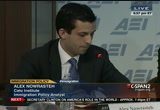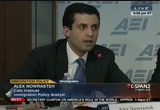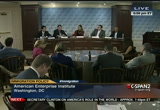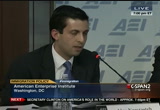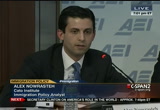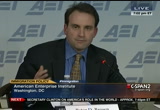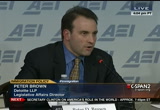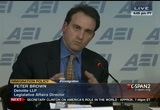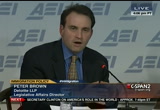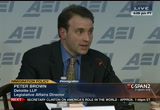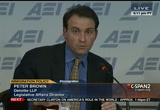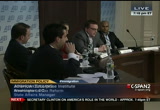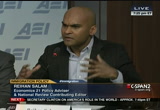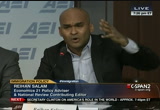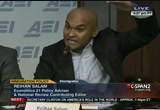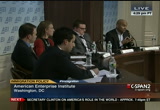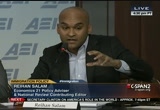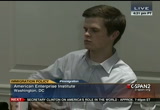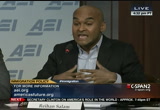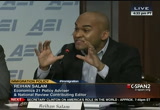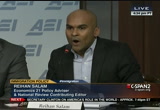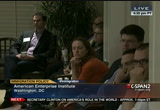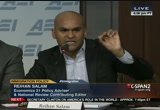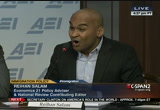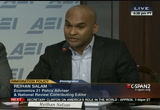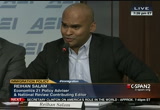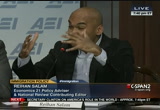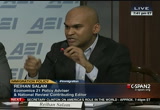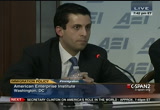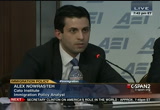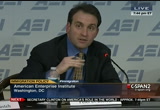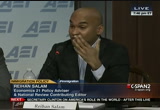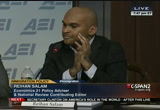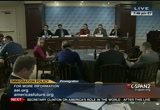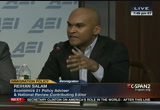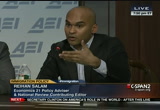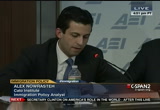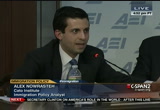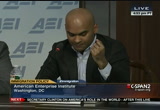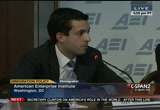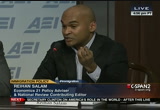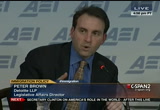tv U.S. Senate CSPAN January 31, 2013 5:00pm-8:00pm EST
5:01 pm
mr. coons: madam president? the presiding officer: the senator from delaware. mr. coons: madam president, is the senate? a quoru-- senate in a quorum ca? the presiding officer: it is. mr. coons: madam president, i ask that proceedings under the quorum call be vitiated. the presiding officer: without objection. mr. coons: madam president, each and every day, the folks i represent in delaware ask me, why doesn't the senate, why
5:02 pm
doesn't the congress focus on jobs, focus on getting our economy moving again instead of what seemed to be endless partisan struggles over secondary issues? and what i wanted to speak to today was a bipartisan bill which i'm introducing which focuses on how to help create innovation focused jobs again in the united states. as you know all too well, madam president, our economic recovery has been slower than we would hope, although it's been steady, there are still far too many americans out of work. in my home state of delaware, more than 30,000. but we are building our way ba back. so the task before us is to think not just about an immediate economic crisis but to take a breath i think and instead focus strategically on the long-term fewer, to take -- long-term future, to take an account of what kind of economy we want to build for our children, for our grandchildren, for the america of today and tomorrow.
5:03 pm
the engine of our nation's greatest economic successes has always been innovation. from the light bulb to the search engine, american inventors and innovators, those who've taken risks and started companies, have created jobs by the thousands and changed lives by the millions. but before new ideas can scale to market and reach out to change the world, they first have to start in a lab or garage. i know from my own eight years in the private sector and my work with a materials-based science company in delaware that products that we take for granted that are today household items in the world marketplace often started as just the sliver of an idea, an idea that needed refining through determined investment in research and development. so if we want to fuel the next generation of innovation, if we want to lay a strong foundation for job creation through invention, i think we have to start by supporting research and
5:04 pm
development. research and development, if it's the lifeblood of great american companies and is what will allow us to continue to make things in this country and to be a leading manufacturer in the world deserves focused investment. if you look at it, nearly 70% of america's private-sector r&d and about 90% of our patents are actually in manufacturing, a sector i think deserves particular attention. revitalizing american manufacturing will create high-quality middle-class jobs for the long run. but doing so depends on our ability to take great ideas and turn them into marketable products or improvements in manufacturing processes that can and will result in things being made right here in america. start-ups and small businesses all across this country are already taking chances to do just that and i think it's time for all of us here in congress to take a chance on them. so last year i worked in a bipartisan way with senators enzi and rubio, senator schumer
5:05 pm
and others to introduce a bill that would make start-up companies eligible for the existing research and development or r&d tax credit. and today i'm proud to reintroduce that legislation as the start-up innovation credit act of 2013 with our original cosponsors, as well as senators blunt, stabenow and moran. this broad bipartisan support i think suggests that this is a bill whose time has come. although we represent among the cosponsors very different parts of our country and very different backgrounds, all of us know that to strengthen our economy, we have to support innovation and entrepreneurship. each of us is committed to fostering the kind of environment that supports the private sector and which turns ideas into innovations, innovations into products, products into companies that help create good jobs. under current policy, one way we do that federally is by supporting research and development through the existing r&d tax credit. companies that invest in r&d
5:06 pm
generate new products which sparks new industries with spillover benefits for all kinds of sectors. that's why there's long been strong bipartisan support for the existing r&d tax credit. by all accounts, it's working. the r&d credit has helped tens of thousands of american companies succeed and create jobs. but there's a critical gap in the existing r&d credit. it isn't available to start-ups because they're not yet profitable. and, thus, they don't have an income tax liability against which to take a credit. in fact, more than half the r&d credit last year was taken by companies with revenue over a billion, well-established, profitable companies. there's nothing wrong with that. it's just not targeting these tax expenditures towards the sector of our economy that is taking the greatest risk and, in some ways, has the greatest potential. so this gaping hole in our policy around r&d can be fixed i think with a relatively simple tweak. i've been working on finding this solution since i first came here. in fact, the very first bill i
5:07 pm
introduced included an expanded version of the r&d credit. and today we take another step towards seeing this solution implemented with the reintroduction of this bipartisan start-up innovation credit act. it says that in order to spur research and development, we should allow companies to claim the r&d tax credit against their employment taxes against their w-2, instead of their income tax liability. that opens this credit to new companies who don't yet have an income tax liability. there's lots of companies we could point to, let me pick one example. denovix, a small business based in my home state of delaware, is developing instrumentation in bioresearch with a team that includes molecular biologists and engineering professionals. the managing director of denovix, fred killhorn, says the legislation we're introducing today would help that company to offset some of the costs of bringing new innovative technology-based products to market. and for that, this bill earned his strong support. he's just one of many.
5:08 pm
there's a remarkable list of outside groups, companies and organizations that have supported it. i'll mention a few. silicon valley leadership group, revolution led by steve case, the founder of aa.o.l., the delaware state chamber of commerce, the association for manufacturing technology, the american small manufacturers coalition, and bio, a national organization that supports companies doing research and development in the biotechnology space. so supporting small, innovative companies in critical early stages of the research and development in my view could unlesion told innovations -- and create new growth for the long run. and today's legislation is a jobs credit. between 1980-2005, all net new jobs created in the u.s. were created by firms five years old or less. all of them. about 40 million jobs over those 25 years. this credit is specifically designed towards those new, young, risk-taking firms.
5:09 pm
it does not pick winners and losers. it doesn't focus on a specific area of the economy or technology but instead supports all private-sector investments, judgments and decisions that prioritize investment in research and development. cash in the pocket of small start-up companies which can make a real difference, especially with financing and credit so hard to come by. it was once said that the states are the laboratory of democracy. in fact, that's where this idea has come from. credits just like this have been done before in arizona, in iowa, in new york, in connecticut, in pennsylvania, and they have been game changers, helping companies get off the ground and keep their doors open during those demanding first years, where they invest and spend so much on hiring and growing. so we know this can work. we also know more than half our current fortune 500 companies were launched during a recession or a bear market. so the next great american company that may redefine whole categories, that may be known worldwide for its products, its services may be starting right
5:10 pm
now in a garage or a lab somewhere in this great country. it's an exciting prospect. in fact, we are really depending on our inventors, our innovators, our small business owners to help innovate our way to a stronger economy and fuel a new generation of job creation. so let's give them the support they need and they deserve at a time when they need it the most. i'm grateful for all the cosponsors of this bipartisan legislation in this chamber and as well to congressman gurlack of pennsylvania and congressmankind of wisconsin who will introduce the -- congressman kind of wisconsin who wh will introduce the house version next week. out of the r&d tax credit, let's open the door to these innovators and see what they can do. i'm confident they surprise us yet again with just how high they can reach and just how far they can go. i think this is a wise investment in opening the doors of innovation, invention and job creation for our future. thank you. and with that, madam president, i yield the floor.
5:11 pm
6:06 pm
mr. reid: madam president? the presiding officer: the majority leader. mr. reid: i ask unanimous consent the call of the quorum be terminated. the presiding officer: without objection. mr. reid: i move to proceed to calendar number s. 47. the presiding officer: the clerk will read. the clerk: motion to proceed to calendar number 1, s. 47, a bill to reauthorize the violence against women act of 1994. mr. reid: madam president, i ask unanimous consent the senate proceed to a period of morning business with senators allowed to speak for up to ten minutes each. the presiding officer: without objection. mr. reid: i ask unanimous consent the senate proceed to sp*z 24. the presiding officer: the clerk will report.
6:07 pm
the clerk: s. res. 24 commemorating the ten year anniversary of the loss of the space shuttle columbia. the presiding officer: without objection the senate will proceed to the measure. the presiding officer: i ask unanimous consent the resolution be agreed to, the preamble be agreed to, the motion to reconsider be considered made and laid on the table, with no intervening action or debate. the presiding officer: without objection. mr. reid: i now ask that we move to s. res. 25. the presiding officer: the clerk will report. the clerk: s. res. 25 honoring gonzaga university on its 125th anniversary. the presiding officer: without objection the senate will proceed to the measure. mr. reid: i ask unanimous consent the resolution be agreed to, the preamble be agreed to, and the motion to reconsider be considered made and laid on the table, and the motion to reconsider be laid on the table with no intervening action or debate. there are two bills at the desk due for their first reading. i ask that those readings take place. the presiding officer: the clerk will report.
6:08 pm
the clerk: s. 201, a bill to prohibit the sale, lease, transfer, retransfer or delivery of f-16 aircraft, m-1 tanks or certain other defense articles or services to the government of egypt. s. 204, a bill to preserve and probing the free choice of individual employees to perform, join or assist labor organizations or to refrain from such activities. mr. reid: i ask for a second reading on both these measures but object to my own request on both measures. the presiding officer: the objection is heard. the bills will be read the second time in the next legislative day. mr. reid: i ask unanimous consent that natalie beckman, a fellow in my office, be granted floor privileges for the remainder of calendar year 2013. the presiding officer: without objection. mr. reid: i ask unanimous consent when the senate completes its business today it adjourn until 2:00 p.m. on monday, february 4, following the prayer and pledge, the morning hour deemed expired, the
6:09 pm
journal of proceedings be approved to date, the time for the leaders be reserved for use later in the day and following any leader remarks, the senate be in a period of morning business until 5:00 p.m. with senators permitted to speak for up to ten minutes each. following morning business, the senate resume consideration of the motion to proceed to s. 47 and the time until 5:30 be equally divided and controlled in the usual form. at 5:30 the senate proceed to vote on the motion to proceed to s. 47. the presiding officer: without objection. mr. reid: the next roll call vote will be at 5:30 p.m. on the motion to proceed to the violence against women act. if there is no further business to come before the senate, i ask it adjourn under the previous order. the presiding officer: the senate stands adjourned until senate stands adjourned until
6:11 pm
6:12 pm
borrowing to pay the bills, and we are being told by a bipartisan policy center and treasury is actually confirming this analysis to lawmakers in both parties, that this could see us through august, if not maybe even into the september before we really have to worry about other risk of default. >> what if lawmakers decide it was best to delay having to debate raising the debt ceiling? >> well, a decision by house republican leaders at their retreat about two weeks ago. they tried in 2011 to use the debt limit as a leverage point of force obama to swallow big spending cuts. it worked, but it was terribly damaging, but the the nation's economy and to their political capital. congressional plummeted to something like 9 percent. and they recognize that this was a bad idea. gambling with the faith and credit of the united states it
6:13 pm
turns out as a pretty bad idea. we were downgraded for the first time in the nation's history. they did not want to do that again. like us said, they did not want to vote for a bigger national debt either. that does not fit with their philosophy, so they came up with this strategy of saying, okay, we will suspend it. in the meantime, we really want the senate to pass a budget for 2014, and the law also says that if either chamber fails to adopt the budget by april 15th, their paychecks will be docked. so the whole idea of this thing is to a postpone this sort of economy prattling default situation until they can prosecute this continuing fight over taxes to a point where the budget is satisfied in the debt limit can be raised again. >> you mentioned the economy rattling, how will the temporary delay affect the economy and the financial markets? >> well, we already know the answer to that. it seems like the financial
6:14 pm
market has yawned at this bill and are willing to accept it. when it was originally proposed, you heard some analysts said the markets are not going to like this. very uncertain. we can keep building the debt limit are threatening to the fall to review months. so far it has not cost a lot of concern. the next thing at think that we really have to worry about is the sequestration cut, which threatens to knock $85 billion out of agency budgets in the fiscal year, and that hits on march 1st. and then we have another deadline after that, the potential of a government shut down a must for the seventh. so i think those things are more likely to damage the economy in the short term than this bill. although, you know, every play russian roulette with the debt limit again over the summer, that is trying to be a problem. >> montgomery with washington post. thank you. >> think -- thanks.
6:15 pm
>> with the 113th congress under way, quick look at a few of the new members from texas. republican senator replaced retired senator kay bailey hutchison. >> you're watching c-span2 with politics and public affairs weekdays featuring live coverage of the u.s. senate. on weeknights what's key public policy events, and every week in the light is nonfiction authors and books on book tv.
6:16 pm
you can see past programs and in our schedules and our website and join the conversation on social media sites. >> here is a look at our prime-time schedule on the c-span networks. >> all these programs tonight's starting in 8:00 p.m. eastern on the c-span networks. >> she was the first lady. she held the job for less than a year, but it was julie power to order the marine band to play a role to the chief when there was
6:17 pm
a president appearing, a custom, needless to say, that we still follow, subject to more criticism, it was also she who greeted her guests sitting on a throne, raised platform with purple plums in her hair. it's almost as if she had recede to that more queenly role that martha washington and deliberately rejected. >> historian richard norton smith on julia tyler moore mary president john tyler while he was in office after his first wife passed away. c-span original new series, first ladies, influence and damage, public and private lives , interest, and their influence on the president, produced the white house historical association. season one begins present state of your 18th at 9:00 p.m. eastern and pacific on c-span, c-span radio, and c-span.org. >> next, today's white house briefing with press secretary jay carney. he talked about check hegel's
6:18 pm
nomination to become america's next and secretary commemoration policy, and the iranian nuclear program. this is 40 minutes. >> it could be. i did not really want to let you guys today. good afternoon, ladies and summoned. welcome back to the briefing room for your daily briefing. i do not have any announcements to make at the top, so i'll go straight to darlene. >> thank you. the jobs council expired today commanded is not being renewed. can you explain why it is not be renewed? >> as you know, when the president took office created the presidential economic advisory board affectional known as the rap. that was an advisory group led by paul volcker comprised of labour leaders who provided outside advice to the president and his economic team at the very height of the financial
6:19 pm
crisis. when the 2-year charter expired, the administration created the president's council on jobs and competitiveness. also an outside advisory board his mission was to bring new ideas to the table from the private sector and how best to support growth and job creation. like before it the jobs council was always intended to have a two-year charter. as you noted, expires today. the work of the jobs council was valuable. while the president did not agree with all the recommendations, he did agree with many of them enacted on a number of them. the job's done so, for example, recommended a new initiative to focus on retrofitting government buildings for energy efficiency. this administration acted of the city to create new construction jobs to the better buildings challenge. the jobs council also recommended new ideas to support our entrepreneurship and small business, investment like create one-stop shop for businesses to make access to information, support an application for sba funding and other services more
6:20 pm
forward, the administration acted on that idea launching business usa to create this one-stop shop. there are many others. the policy -- rather, the progress made by the jobs council on the number of specific policy issues as up to determine the next phase of our days of the business community and other outside groups on growth, jobs, and competitiveness. today we are announcing the white house will begin a new expanded effort to work with the business community and other outside groups have been specific policy priorities promoted but jobs kelso, including expanded new skills and talent initiatives promoting entrepreneurship and small businesses expediting infrastructure projects across the country and continuing progress on fiscal issues and tax reform. you know, i think you have seen this president engage with repeatedly the business community there is jobs council and on issues specific matters. over the last several months, as you know, we have engaged
6:21 pm
directly with business leaders on the need to avoid the so-called fiscal cliff, actively engaged in multiple occasions and their views on that issue were extremely helpful in bringing about the resolution that we were able to bring about. right now we are appreciative of and the engagement -- the business kina the is offering and the issue of emigration reforms. and adding it will continue. on wednesday just this week senior members of the president's team held a call and immigration reform with over a dozen leading business leaders, including steve case, greg brown of motorola, dan actress and a gm and joe from deloitte. the president will continue this engagement with outside groups next week. pretty good answer. [laughter] [inaudible question] >> a new council. >> we continue -- we will engage
6:22 pm
in a new effort to -- we will launch a new effort to engage with business leaders and other leaders, and the number of the job council was not business leaders alone. on the specific areas that is best. you know, i have no body tab announced, but i think you have seen from the president's and the white house and the administration's rather incensing days with the business community, we're going to continue that on a variety of fronts. [inaudible question] >> the lot of that ever mentioned earlier. how can you not see this as a failure given the -- >> it was created for two years, and its charter expires. the work that the jobs council did was very helpful. a number of the ideas were acted on by this administration. as part of the president's overall commitment to job creation and economic growth.
6:23 pm
when we hear the you know, some of the somewhat ridiculous criticisms about this, they come from people who have -- on capitol hill live consistently opposed every growth initiative and job creation initiative the president has put forward, including in the american jobs act, the proposal the president before to the speaker as recently as december. you know, when economists, independent economists look at the budget proposals that republicans claim have been job creators, the facts are clear that they have not been job creators in the near term. proposals that the president has before, some of them, after consultation with his jobs council and other business leaders, would put construction markets back to work building our infrastructure, comes back on the beat, teachers back in school. time after time republicans who opposes measures preferring, instead, the policy that, you know, expands or continues tax
6:24 pm
breaks for wealthy americans while asking senior citizens and others to foot the bill for deficit reduction. so, you know, it is a little ironic to hear from those two, with great fervor, embraced the policies that helped create the worst economic crisis of our lifetimes, who resisted the policies to -- that have helped lead us out of that crisis and then to that time of growth and job creation cannot be critical of this. >> a little ironic to say the context of the economy having contracted, -- >> we have had sustained economic growth for three years, 54 months, i believe it is, job creation. 2 million jobs in the last year alone. we have a lot of work to do, but if the comparison and to you know, i encourage it to me know, those two are inclined, go back and look at the history and it
6:25 pm
the policy supported by the critics. what they resulted in compared to the policies pushed by this president when it comes to job growth and broader economic growth. you know, the comparison does not favor the critics. i think is fair to say. what is absolutely true is that if the republicans want -- those who are criticizing on this because they feel like, you know, it's a safety for them, if they want to embrace infrastructure investment, if they want to embrace, you know, measures that will put teachers back to work or cops on the job, if they want to embrace some of the proposals the president has before for investment in new industries and technologies, we would welcome that, but unfortunately, by and large, we face resistance on that. the renewal of the production tax credit that, as you know,
6:26 pm
with some exceptions notable exceptions, republicans opposed. will we know because there was a report out today that we have historic expansion in the one sector last year in the protection tax credit was very much a part of that. >> the syrian government said today warning of a possible response to the israeli attack. are you concerned that this will happen? >> again, i would refer you to the israeli government on matters like that. >> on the jobs -- >> go ahead. >> come on syria, in light of the israeli threat there, how concerned is the u.s. that hezbollah is getting weapons? >> again, i don't have anything for you on questions about those reports. i would refer you to the israeli government. >> a u.s. official is quoted talking about this. you can't give us anything. >> again, i don't have anything for you.
6:27 pm
>> in the hearings on capitol hill going on right now, senator riegle has been taking tough questions. with regard to something he said, does the president believe the government of iran is legitimately elected? >> and sorry, said that again. >> to the presently the government of ron is legitimate in elective? >> i think our views of us president's election were to be expressed. the president's views on that matter, and our views on the behavior of the regime in tehran are expressed again and again and again. the fact is, we judge a run by his behavior, not by its words, by its actions, and they are consistently in violation of the united nations obligations, the international obligations and because of that they are enduring the most intense sanctions regime in history that has had a dramatic impact on their economy as well as on their politics.
6:28 pm
and, you know, that pressure will continue, and it will increase as long as they refuse to live up to the international obligations with regard to the nuclear program. >> and on -- at tough questioning from republicans about the position have taken on nuclear disarmament. is the president at all concerned, he has changed his position to satisfy concerns of senators to the -- >> the position that senator als taken on nuclear weapons is the same position that president kennedy took. it is the same position that president reagan took. is the same position that, you know, henry kissinger and sam nunn have taken, and it is the same position this president expressed in his speech in prague. you know, the world would be a better place if we could rid it of nuclear-weapons. until that time comes about, we maintain the most serious and
6:29 pm
credible nuclear deterrent as we should. that is -- senator hegel's views on this matter are very much the mainstream of a republican and democratic party and our public opinion. what is out of the mainstream by those who are suggesting otherwise. >> first off, on hegel, hegel has suggested that the military option against is not an option. i just want to be clear. >> i believe he said, as the president said, that he takes no option of the table and every option remains on the table. as the president's position, and it is the position that center a supports. >> on the jobs council, white and four times? this was such an important tool for the administration to get input from the business community. >> the jobs council provided a series of ideas, many of which the president acted on. it did not require a formal meeting for those ideas to regenerate or work on whether the jobs council or the
6:30 pm
administration and, again, this president's the engagement with the business community, i think, has been aptly demonstrated in recent months, and will continue. and the commitment as a matter of policy to job creation and economic growth is just, i think, fairly by outside economists very favorably compared to alternatives before by republicans in congress is policies nobody judges like the ryan budget and anything for near term job creation. the president has insisted all along that as we address the need to reduce our deficit we do it in a way that he insists that we continue to invest in areas that allow our economy to grow. ..
6:31 pm
>> it's a group he created that did very effective work on behalf of the country on this administration for two years. there's a two-year charter and the charter has expired. the entity that is present at self-created ignores all the work the president has done to as creating jobs and fostering economic growth, work is frequently, if not always resisted by those subtly promoted the policies that help
6:32 pm
create the worst economic crisis in our lifetimes. >> qualified for a two-year charter, but has been that for a year. >> i think i answered your question. i appreciate the fact that you are more concerned with meetings in progress. there's no creation, no dispute over the fact that witness president took office, the economy shrank and a quarter before he was sworn into office in the fourth quarter of 2008 by nearly 9%. that is catastrophic. jobs were lost at a rate of fit the thousand per month. there's not economical to our fact. that kind of economic client was reversed. that's the measure of your commitment to job creation and economic growth of the president greatly appreciates the great country of work the job council is done, the work they've put
6:33 pm
forward and looks forward to his engagement with the business community going forward, a variety of which i just enumerated. >> the vice president is going to make this herein opposition leader, also the russian foreign minister bunny rice in germany. we've heard varying accounts as to whether the screenings are separate or whether this we will meet together. can you straighten that out? >> i have to refer you to the vice president's office. i haven't looked into detail on a schedule for his trade. >> would it be a good idea to the searing opposition leader sit down with the vice president? >> i would refer you to the vice president's office. i have not looked into schedule. >> i'd like to ask about iran's announcement that it upgrading centrifuges. what do you have a not quite
6:34 pm
>> we've seen reports that iran has announced centrifuge production unit at natanz. there's no indication of how many centrifuges iran plans to install. this does not come as a surprise given the iaea's regular reports on iran's development of centrifuges. however, the further escalation can you renovation of the speaking about moments ago of iran's obligation under brother that united nation security council iaea or board resolution spirit would mark another provocative step in only by further isolation of the international community. we continue polluters to tennessee for diplomacy, but actions like this undercut efforts of the international community to resolve concerns or is there clear opinion. >> the president recovery board
6:35 pm
arguably succeeded in stopping the recession if you will. >> the perab success is the administration and congress that help go for the recovery act, measure is to say say the mobile industry, they voted for measures to stem the crisis in the financial sector. there's no question of base from perab, from as they canceled that actions are taken by those in power to take this action, the president and congress. >> all except that. >> since it is created, unemployment has fallen only 1.1% seems excessive that? >> again come the president repeatedly talks about the need for us to do more, that we're not where you want to beat with economic growth and job creation. there's no? people would be employed have republicans start to surpass the american jobs act.
6:36 pm
it's a simple mathematical fact that he would be where teachers the classroom and policemen on the beat, and construction workers building infrastructure that would help our economy grow more in the 21st century. unfortunately can republicans adamantly refuse to do that citing the need to extend tax cuts for hedge fund among others. he suggested about how best to grow our economy and create jobs. the fact is compared to the record and the situation the president inherited a couple recent economic growth and job creation including 2 million jobs in the last calendar year. >> i'm curious if the message would be from this white house and the president goes to visit with the searing opposition. >> will come away for 10 supporting searing opposition. we have also can tenured our role as the single largest donor
6:37 pm
of humanitarian aid of people who are suffering so mightily under the wrath of bashar al-assad and we'll continue to work with the searing opposition to organize itself and help prepare, help in its virtue prepared for a post-assad area, for a syria in which the aspirations and the right of the syrian people i respect it, which stands in stark contrast to the butchery of the assad regime. >> and opposition leader has expressed a willingness to meet with representatives of the assad government. >> i saw those reports. i don't have any update on our views on this. what is absolutely the case is a serious future will not and cannot clued transcendent. the syrian people have cited
6:38 pm
that. he has long sense given up any opportunity he might've had to participate in serious future. his hands are drenched in the blood of his own people. i'm sure in our conversations and conversations with international partners who searing opposition, this will be discussed, but what is unquestionable for syrian opposition has to go. >> is there any value in meeting? >> i don't have a particular response to that report, but our views on assad feature is not changed. >> have there been reports in the president has full faith and confidence -- >> i've seen those reports come i just don't have anything on those reports. >> he played a significant role in immigration.
6:39 pm
>> again, i don't have anything for you on this reports. >> i've a question about tomatoes. today trade agreement with mexico set the minimum price for mexican tomato expires. what happens now? >> discussions through the department of commerce and the current suspension agreement on going. you may tell he didn't write this. i know commerce is looking to find a mutually acceptable outcome for everyone involved, but those discussions are ongoing and i don't have an update for you. i would have to refer you to commerce. they may have more specificity on it, but discussions between commerce and mexican commander growers are ongoing. roger. >> you mentioned the top telephone conversations between administration yesterday at ces on immigration i think it wise.
6:40 pm
can you go into more of who is on the call, read release the list of ceos and what was the administration's pitch down? >> will look, you've seen across the board very broad support in the business community for comprehensive immigration reform and i support is welcome. and i think it is reflective of the growing consensus across the country on the need to move forward with comprehensive immigration reform. it's a matter of benefit to the economy. a matter of fairness to the middle class. when it comes to business at your commenters obvious interest at high-technology companies have as well as other companies. that's where the president has for so long promoted a comprehensive approach that ensures we move forward on all
6:41 pm
these issues at once because that allows us to build this consensus we have seen and it's been very welcome developing the sudden increased intensity in the last several weeks. we're working with congress. we look forward to the senate moving forward in an expeditious way to produce legislation. the president has said he wants to see the senate move forward. he hopes they produce a bill that would gain substantial bipartisan support in the senate that could then be passed by the house and that he can sign. a progress stalled in the senate or breaks down, the president is prepared to submit his own bill and asked the senate to vote on it. this is an issue discussed briefly during the campaign. it's an issue that he sees it unclear on for some time. >> but rather has to do? >> i don't have a more detailed readout of the call to you.
6:42 pm
this kind of conversations or in exchange of ideas and there's no question that businesses generally speaking, the business sector is supportive of comprehensive immigration reform as are so many intersect yours of our society. >> jay, going back to the question about hegel's comments about the iranian government being elected and legitimate, you may recall vice president biden said there were doubts about the legitimacy of the election. further to give you a chance to put a finer point on it. is this government elected and legitimate? >> the government we deal with has continued the unacceptable behavior received from tehran for some time. its refusal to abide by its international obligations and the presidency is on the protestant reaction to the election are very clear and
6:43 pm
remain the same. the issue is we have pursued a policy that is imposed upon the country the most severe sanctions in history significant economic consequences. we avert our international partners to bring about a consensus on iran's behavior that never existed in the past is not to have to increase the isolation that tehran feels. the president has made clear when it comes to iran's development of nuclear weapons that all options remain on the table. the window for diplomacy remains open, but it will not be open indefinitely. >> is it legitimate? >> it is the government we deal with. the government continues its obligations in that behavior is illegitimate. cheryl. >> two quick questions. one is the white house picked a
6:44 pm
date to release the president's budget? >> i don't have one to announce today. >> and also, the acting a lot major wreck or, just zients had to give up acting designation because of the time involved. >> had no personal announcements to make today. i wish a day. [laughter] >> is the president watch and vehicle hearings this morning? >> i was with him for was with them for some time earlier today. there is not a television around. i can't say definitively he has been edited. he doesn't spend a lot of time watching tv. >> do you know theses of the reports is her do? >> i didn't discuss the hearings. i know he believes senator hagel would make an excellent secretary of defense.
6:45 pm
and he will effectively implement the president's policies. >> whether today's briefing and taken that to the american enterprise institute for a discussion on how conservatives can provide solutions for change in the u.s. immigration system. this is live coverage on c-span 2. [inaudible conversations] [inaudible conversations] [inaudible conversations]
6:46 pm
>> good evening, ladies and gentlemen. welcome to the american enterprise institute for this roundtable with america's future foundation. name is robert pastor, executive director of america's future foundation in this event is foundation in this event is part of a the year that is not fully, where young professionals come together to plan and organize a panel including speakers and coming up with a topic. if you're interested in getting more involved, please contact your america's future.org. we want to specifically thank the american enterprise institute for hosting us, particularly lawrie, d. and the events team. the future of roundtable includes a february panel with the independent women's forum, which will discuss scaring us to death, policies overregulated things like climate, obesity and chemicals. they're also meant to hillsdale
6:47 pm
college kirby center for a panel in the constitution's direction on foreign policy. america's future foundation's online magazine double tank of us in professionals the opportunity to find their voice and am pleased to on the editor, georgia turkey. are you around? please network withdrawal if you have an idea. but that's a heavy right for us as well. we also invite you to a number of other networking and professional development events. learn more at america's future.org or follow us on twitter at afs d.c. it is my honor to introduce our panel moderator this evening, maurice sanders. lori is the manager of the richer freedom project at the american presence of gibberish insert for the last three years. in this role she supports adis
6:48 pm
external affairs and student outreach teams as well as marketing and outreach for arthur brooks latest book, the road to freedom, which i highly recommend if you haven't had a chance to read. she's a member of the america's future foundation planning committee on which he asserts as 2010. the shyness and welcoming, laurie sanders. [applause] >> thanks, roger and welcome to the american enterprise institute. i'd like to thank america's future foundation for their willingness to host this event and hope you'll take roger's words to heart and look into events and wonderful opportunities for young professionals. since the 2012 election it seems immigration reform hasn't left the news. we hear numbers bandied about left and right from this one piece by ezra kline with a 110 of the population is
6:49 pm
foreign-born. one quarter technology and business has started between 18 and five in thousand five p1 half of silicon valley startups have a foreign-born founder to be here but the numbers of these as america's issuing any macros we can expect are increased immigration in the here but the most dreaded, the 11 million illegal immigrants and the potential went as a 951-mile border -- defense that could build to secure the border. it's important to remember behind all these numbers are real people. our immigration policy is to we are as a nation are they speak of fairness, expressed dedication and hard work, family and community and given america's a country dedicated to quality in opportunity and liberty for all, it seems there's a growing consensus or immigration system doesn't make sense. so where does this leave us in specifically, were silly conservatives? free movement on building our
6:50 pm
economy are making government systems better for people, renewing american values of family health, is there an answer that isn't politically toxic for conservatives? tonight we hear from a writing exercise have a lot to offer in the immigration system. we'll kick it off with the immigration policy institute for global liberty and prosperity to explain in great detail the details of our current immigration system and changes he thinks are necessary. alex previously worked at the competitive enterprise institute and his work has appeared in "the wall street journal," "houston chronicle," "boston globe," "politico," and many other places. he's appeared on fox news and had his numerous stations across the u.s. next is peter brown, federal regulations group to give us an idea of how immigration system effects. peter is a leader and executive branches. they were to advocate and erase
6:51 pm
the firm and federal global marketplace. his primary focus is the national security, defense procurement. peter hesser public-sector organizations and services of public policy for 16 years. peter will be followed by joshua cohen, government affairs for tax reform. he looks a mistake on the immigration position. josh is responsible for federal immigration advocacy and state budget and tax issues. he appears to have a state government affairs at the national taxpayer union and before that served as legislative assistant to alexander g environment and agricultural civil justice task force. finally, we'll hear from ray hunt salon on politics of immigration reform. he is a nonfiction writer and analyst and policy advisor for economics 21, contributing editor at national review and columnist for writers opinion in
6:52 pm
a cnn contributor. after each panel sp, we'll take questions from the audience. but for microphone before you ask your question as it is wise to do with i.q. to be up. finally, please save any protest statements in the form of a question. thanks, we'll turn it to alex. >> thank you, lori. it's a pleasure to be here tonight. this is the earliest i've been out of the office and weeks. what should a supporter of free markets and private enterprise think about immigration? which is good policy be? of course the answer to this question is fairly simple and straightforward. legal immigration, whether through a guestworker program or permanent migration should be a lot easier for most people throughout the world, especially workers. this conclusion is easy and simple to reach, natural for
6:53 pm
free marketeers. it doesn't really matter what basis to approach, by their natural rate base free marketeers, would you like free market of consequentialism for utilitarian arguments or whether you wish that are ethical intuitionism. the answer is all the same. let's give you a bit of a setback. about the markets in the world that have to do with the flow of goods and services across borders with the flow of production, labor is the masterstroke of apollo 10. labor market is one of the largest and most important united states and world, not only to our economy, but moral and ethical health of the nation in individually. nothing is more depressing than being unemployed in this economy. it's important for our society. free marketeers out deregulating, opening economies, allowing our competitions, alex
6:54 pm
refers to freedom lead to better results and this is the same in labor markets internationally as other markets domestically. i will approach this issue from an economist standpoint. resume training thing. let's talk about issues people are concerned about. how has it in the recent past? a lot of details and answers not very much. there's 40 million foreign-born workers americans in the united states. about 13% of the united states is foreign-born and the big issue is wages for american have not decreased very much because of immigrants impact. the reason is immigrants had different skill sets for the rest of us. they have -- a letter high skill, high and. all of the most skilled on the low-end. most americans in the middle. this has been sustained throughout american history.
6:55 pm
when america had open borders you had rapid wage increases over time with massive amounts of immigration, more so than work stressing today. today the only group of americans who possibly have seen decreases in wages due to immigration are the group of people 25 years or older with less than a high school degree. that's about 12% of the american workforce over the age of 25. there's better things we can do to help these people rather than close enough for labor markets are international flows. another issue a lot of people are worried about his crime. illegal immigrants or unauthorized immigrants creating crime. immigrants are far less likely to commit a violent or property crime than nativeborn americans. incarceration is one fourth as high for nativeborn per capita. most are for immigration
6:56 pm
violations. when you hear people talk about that, that's the reason they're in prison. what you do see a second and third-generation immigrants, especially from hispanic countries and on average have higher rates of crime and other nativeborn americans and moderate by the fourth-generation. the very optimistic interpretation of this is they are similarly america has on average more crime than other nations around the world, so in order to assimilate they reach the standpoint. the exception of asian immigrants who for as many generations as the convention united a feather boa crewmates. also compared to the irish immigration and in 18th and early 20th century come hispanic immigrants are the more peaceful ones who come to the united states. another issue people are worried about his assimilation, one that i share sometimes. let's take a look at this. most people never got immigration are worried about hispanic immigrants.
6:57 pm
that's a fact when you talk to people. i third-generation come hispanic immigrants are an average as far as we can tell 100% fluent. if your grandparents came from another country, odds are heuer 100% likely to be english poet. breaking it down to 70% english-only, 22% bilingual. something about coming to america -- america has been referred to as a graveyard of foreign languages and that's happened in the past with every language from gaelic brought over with irish emigrants to polish. now in the future will happen again this vanish. -- spanish. healthy people need to be restrict it come a better way to go about it in the current system dominated by quotas, restrictions, arbitrary regulations. some of the books going back a hundred years they don't make much sense to modern society.
6:58 pm
that is free marketeers promotion push for the use of prices to regulate immigration more than anything if we have to regulate in the first place. specifically i propose diminutive quotas on immigrants and replacing with a tariff-based system. it terrifies any economist will tell you this much more efficient than a quota-based system. do i talk about international trade, almost all economists are free traders pierpont and new goods and services is restricted and doesn't change based on the price. if we let the quantity cici that is much more economically efficient. trying to argue and government bureaucrats argued about specific numbers and skills of immigrants allowed in the united states is probably similar to discussions of the coplanar sides and trying to figure out their plan for the next year.
6:59 pm
the information is old, out of date. we have to support for an healthy people. we should use the turf to do it. people will be paying to come here. i hate to break it to you, but they're already paying to come here. legal immigrants pay over $4000. mexicans pay $9000. for chinese immigrants, the average is $25,050,000. those prices reflect the ability to be deported anytime if ever captured. it definitely to pay higher prices. that also includes the risk of slavery,, criminal abuse and other things. to avoid those problems, a lot
7:00 pm
of immigrants are willing to pay a lot of money for the ability to come and work in the government should capture money rather than cartels. to the legal immigration system, let's not ignore the fact one of the biggest cost is the cost of waiting in line for the linux says, trying to pay lawyers and legal fees, bribes, everything else. who should replace the entire system for peaceful and healthy immigrants in the united states. to policy is one thing. the more important thing is way for politicians to implement the good policy. james buchanan, public choice economists who died this month cut its politicians are interested in their rational self-interest. we need to convince our than anybody come in the gop in one of the best ways to do is bookmark or rubio said. the gop needs to be the party of legal immigration. in coulter or laura engram and
7:01 pm
critics have said you could never do democrats on immigration. there is going to go around you. supporting legal immigration and visa programs can increase green cards for low skilled, has stood amid skilled. if you want to see labor union democrats and leftists freak out, the republican party should advocate for massive amounts of illegal immigration through guest workers. will put democrats in a bind because they would do that to her and the coalition going forward. we saw in 2007 when senator dorgan introduced an amendment to kill the guestworker program or skilled immigration reform effort with 100% behind it. unions trying to prevent a low skilled guestworker program from being implemented are put in a final bill. if you want to be the party of legal immigration, i suggest the republican party do and go around democrat and that's the strategy. thank you.
7:02 pm
[applause] >> by name is peter brown. thanks again for inviting me to speak on behalf of the industry. many years resolution was to be more domestic. so far immigration reform is looking like a very real possibility. in michigan wolverines are number one in the country most importantly, go blue. see what happens saturday night. you know, when a second folks earlier, they were saint deloitte, would you care about immigration, what's your interest in not? from a professional services firm, there's not a ton of awareness one has got issues we face and how it impacts us. a little bit about deloitte and our firm quickly, we are a large global firm.
7:03 pm
we have 50,000 employees in the united states. 180,000 around the world to work for different of which is moving to high-tech. were big four accounting firm. for by fortune 500 companies. we are consulting firm which makes a large percentage by business. many, many employees in different technology field and many people with stem degrees in computer science. that's a large part of our business for tax advisory firms and provides services and financial advisory services. so when our business, since were not a products company, our business is people with knowledge, ideas, innovation, helping clients solve their most challenging management and technology problems. repeat with deep industry
7:04 pm
expertise to deploy in a timely and quick manner in timing and speed is everything. within our broad workforce, the complementary u.s. workforce with foreign workers and mobility is very important. we hire people from college campuses on each one of these. we also use immigrant as well as green cards for people wanting to become citizens and then we also use -- with the good people of expertise and specialized knowledge around the world to bring into the united states. so we leverage other like the visa as well. it's a matter of leveraging those to ensure clients receive the most timely, modern and
7:05 pm
technology process so they can innovate as best they can. we all know statistics about 20% of companies in the u.s. of immigrant founders. 40% of fortune 500 then took another a child and a lot of those are client. the broad point for america is to stay competitive in this economy. we need to modernize and change the way we deploy our talent and how we encourage people to get educated in the united states. maybe colleges are working with universities a few key people in the united states, not encourage companies and people to move back to their countries. the issue has recently become an issue for the foyt. we look at this from a broad prison for a while, but like other companies, microsoft, high-tech companies and services
7:06 pm
companies, this is a recent thing given challenges we've had to hire and maintain than fill. as an internal statistic we hire 7000 employees, 7000 people and that's still not enough to be a would've filled a need given attrition in turnover and things of that nature. started streamlining the process, we all know about the backlogs that exists right now on how long it takes to get from beginning to end and the processing standpoint. the timing of that and how quickly we can have people deployed to our clients to help them solve the problem at innovate, which also helps create more jobs for clients to burn products on the market in a
7:07 pm
timely fashion as well is critical to our business in seeing the economic imperative use quite a bit now postelection and that applies to all skills labor. so within our workforce, we have about 5000 employees in stem fields. a lot of that is within computer sciences. suppose these introduced for a while are starting to get momentum that look at the broad prison of that includes science, technology, engineering, math. with the iic science and not, go look at that another day. policy system in the process, make pieces were bitterly available and really make the united states a more simpler place in more business friendly place to keep foreign workers
7:08 pm
educated here as well as people founded by immigrants from an employment standpoint to make it a more user friendly place. boosting proposals that have come out this week. it's definitely immigration week. briefing the president's proposal, the senate gang of a proposal, which includes a high scope he said that, to get the attention it deserves in the broader discussion. a reasoned approach and looks at things, including things another legislation. you may have seen the bill introduced, hats, klobuchar bill introduced, which is a lot of positive, interesting and things that would help high-tech and generally keeping talent here, one of which is looking everything the visa caps.
7:09 pm
right now the cap is at 75,000 annuity interesting to see the cap as an economic indicator is stored as an indicator of demand from our perspective. so two years ago 65,000 tablets had in november. plaster it was was hit in june and this year is expected to hit very early, which shows despite the broad unemployment statistic, unemployment in the high-tech stem cell is under 4%. so there is that sort of demand out there know that interesting to see in the coming months how that plays and some of the proposals and provisions to address those issues as well, understanding this always trade-offs with green cards. another bill introduced in crossed the line per country, change in the per country caps for green cards is also included
7:10 pm
in that as well. obviously this seems like a sprint now, not internally we talk about how it's a journey, not a sprint. this week ago the momentum and the timetable is people who have been doing this longer than i have say take say take a deep breath and we'll see what happens. the other thing about to touch on from a two-way perspective is not only u.s. workforce, that things were doing unimportant as k-12 in looking at some things that would help encourage people to go into the sealed and reliever demands. speaking of our firm, delete, from a pro bono perspective were involved with college summit, junior achievement, a lot of pro bono and skills-based training and that's a big part of our culture and who we are in u.s. and around the world. other companies are very involved in not an encouraging
7:11 pm
people. that's restaurant figure out how to attract people interest in field, things aren't even covered, feel the need and the business community. it's also an important community involvement that we hold dear to our heart and see if an imperative incentive are committed to further leadership on down. i think that where, just to close, our business is dependent on the right people at the rates skill sets to service our client and time-to-market is important. ultimately, we like to create a positive immigration experience for people, whether that's spouses and children coming in with our employees and to reduce the wait time, which hasn't been as positive for a lot of our
7:12 pm
people, to make it a positive experience with both the u.s. economics and employees in firms as well. i look forward to your questions. [applause] >> i'm josh calling in american for tax reform. didn't know that before you touch on the panel. looking for two indian on saturday night. but we're here to talk about immigration. i'll start by saying i asked events shortly after i moved to d.c. honestly because the allure of an open are at the age of 22 was not worth passing up, the cutthroat and kept coming because the events are great. it's a pleasure to be on the other side get a chance to share my thoughts on the immigration issue. alex has covered -- he's a
7:13 pm
policy expert for right of center and go. i kind of want to talk about the politics of the issue and sort of hard to get the republican party to lead on the immigration issue to embrace the issue, to help reconstruct it in getting something passed. we may have failed in the middle of the last decade. a lot of the crowd, more libertarian leaning. that's great. i consider myself conservative, list of libertarian. i hang out the returns of the time. you guys are awesome, but the issue is largely settled in the libertarian community because libertarians believe in free market for labor, just like trade and good and services. the business community is largely onboard. some on the high scope type, some across-the-board and as we
7:14 pm
started complaining on in our center-right coalition for the last decade. and that's not enough. a sort of why we failed during the bush administration to pass comprehensive immigration reform because we underestimated the power and backlash of social conservatives, grassroots, evangelicals, law and order, cultural conservatives. these folks matter whether we agree or not it's part of the greater center-right republican movement. i think we change not this time, so what i want to talk about mostly in all be relatively brief, is how we speak to that section of the center-right or conservative movement and the amount ordered for immigration reform. there's three or four major ways to do that. we need to talk about morality, the moral side of the hottest
7:15 pm
breaks apart families. we need to talk about the idea of an american exceptionalism, which not everybody agrees with. i tend to think america is the greatest country on earth that i love this country latkes cultural conservative elements agree it is a very salient talking point to talk about what immigrants want to come here to be part of our country, to participate in our economy go to schools, worship in churches and serving military. the effects of regional party is that we be destined to be the right of asians, hispanics and immigrant groups who want to come here. look at the demographic trendline. being a regional party is no fun. i think we should talk in helping to more deeply in my few minutes is taking a look at the
7:16 pm
anti-immigrants groups that have branded themselves as derivative when really they're not, look at the root of those groups and their broader motivation, which is a direct conflict with social conservatives. i'll quickly talk about the first three have been sort of delve into the fair numbers center for immigration studies aspect of my talk and then i'll turn it over. some on the morality issue, alex talked about human trafficking is a key part of it. that's an issue that's exacerbated by restrictions and immigration laws. it's profoundly sad and profoundly depressing and really strikes a note with social and cultural conservatives. were also tearing families apart. our current immigration system is fundamentally anti-family. but there you have been across
7:17 pm
the board illegally to work and are unwilling or unable to cross that he can read on a full build come back and continue to work next season in the field. you have kids who are u.s. citizens because they're born here, but their noncitizen, undocumented workers in this families are torn apart probably never to be reunited. is our deeply emotional, deeply problematic issues. we can talk about economic growth so we want. it's basically my whole motivation issue. but he did talk about the fact families are torn apart and that's a terrible thing. on the concept of the effects of a regional party, it resonates with social security supreme court appointment and
7:18 pm
confirmation or rejection of supreme court judges. you can't do that if you don't have the presidency or the u.s. senate. if we don't do better politically with the growing immigrant population to more probably because the rest of this decade of house seats are distributed across the country, but the u.s. senate and presidency will be a bonus every once in a while and then you're talking about a whole host of cultural issues decided by the supreme court that we won't go to weigh in on anymore. on the american exceptionalism in goal, this is something i get excited about. my libertarian friends make fun of me because they get excited for the olympics and put an american flag in front of my house. about one quarter joking, three-quarter sirius. america is the greatest country that's really inspiring people some across rivers, packing into
7:19 pm
120-degree truck trailers, bitterly dying to come to the country to participate in our awesome system because of the freedom and economic opportunities, fleeing oppression in their own country. they're coming to serve in our military and its effect on credit scores, race families. that is a beautiful thing that a lot of republicans who are more socially and culturally conservative identify with that stuff and it's a very inspirational message. but really what i want to delve into is the anti-immigrant, anti-immigration groups such as the federation for american federation reform, cios and
7:20 pm
numbers u.s.a. these are very effective grassroots lobbying and advocacy and policy groups that have sort of co-opted republican party. the litmus test on issues to be a conservative. you generally need to be in favor of a smaller government, lower taxes for free markets, pro-life or a strong defense, but one of the check boxes added to the litmus test of the immigration restriction and that's because of the hard work of the folks at casa to define the position and sealing the border, even people who are here. but if you look at these groups, they don't have a conservative bone in their body. the founding principles of organizations are radically left of center. they're essentially population control advocates who think more
7:21 pm
people need more carbon emissions and a dying planet. the guy who founded fear is a radical environmentalist who doesn't like people. it's not even that is like mexicans were necessarily a racially-based things. he thinks more people needed to claim the environment. his tools to advocate for population control are certainly immigration restriction, but also being pro-abortion, pro-sterilization, pro family planning. he's an advocate of china's one child policy because more people are disturbed. so we organize multiple planned parenthood chapters in the 1960s. in the 70s he served in the sierra club population committee and is a port number to zero population growth. he has since started there,
7:22 pm
funded cas, funded numbers, all of this movement in coaching can every principles. some board members are even worse. the executive director refers to china's foreign policy, whichever decreases disgusting as an international family planning program. one of the board numbers wrote a letter to the editor of "the new york times" in the 80s and said i think china has developed one of the most humane and rational population policies in the world. that's unbelievable. this is information that hasn't caught up to the broader conservative movement because it's just the commanders to that immigration restriction is part of the litmus test. it's not because these people don't have a conservative bone in their body.
7:23 pm
for environmentalists and they are radically pro-abortion. not pro-choice, pro-abortion. this is something we'll be pushing quite a bit as we try and educate to grassroots, you know, what does the immigration restriction movement stands for quite when you write a check, as a member of congress, who are your supporting them what is the ultimate goal here? is 180 degrees opposed to mainstream thinking. key in the center-right community i must start with a blank slate and talk about benefits economically, from an american dream for national security stand point us to a rational immigration policy. that's essentially all i have.
7:24 pm
i would advocate rs a libertarian policy community to talk about all the benefits of immigration from an economic standpoint certainly. but no we can't do is just the business community and the free market policy. we need to get in the community rather than hispanic outreach, duty calls talking to her folks about what a rational policy is. just to conclude, i support the basic candidate plan. i support it pulled forward immigration program that includes a path to legal service for people already here from a vibrant workable programs in securing borders. it's important we need to continue to talk about that. the key to organizing the right the teacher broader reform its
7:25 pm
permanent social poststroke conservatives we never about is not going what they're talking about. they have legitimate concerns and ideologies and without them or not going to get anything done. they. caught back [applause] >> i'm delighted to report that trip for our moderators a pushover. i thought she would adhere to a time limit. we have until 7:45. go take my sweet time talking about a variety of ideas but little attention of the folks that can't be for us. [inaudible] >> my pleasure, a plan on it. so much to talk about in ideas and so many referred in the immigration debate so far. a couple things. the first humanitarian principles that were. i'm going to say a lot of things to make this an unpopular and very in contrast to these
7:26 pm
bedrock mainstream conservative principles. and saving myself for a fall, but i'll do that. one thing is american exceptionalism. there's a lot of countries that accept immigrant we definitely don't have the best immigration policy among them, not by a long shot and there are bangladeshis who die every day trying to get into in ear. i promise you in is not the most of the country in the world. they go there because they were slightly better shot at life. similarly, malaysia has age of conan immigration policy. this happens around the world. economic migration is progressive for the reason would've been a world in which there's entrenched poverty in much of the world. look at coutu bar. i promise you, it's a shiny economic liberty at everything else. it just happens that these large folks who want to miss one place
7:27 pm
to another. yet when you see the humanitarian debate in the context of u.s. immigration policy, it's funny because it's not exactly will they come up with. so let's say the ideal humanitarian policy is based on the premise that every human being a sequel. but mere factor born in guatemala or zambia does that mean you're any worse an american. the implication is we should have open borders. one eisai cosh, we had open borders in 1805 and we had a very open system. it was close steadily to 19th century, but let's say the rationale yet. they were very high barrier countries because we didn't have the density communication and immigration over. does the slow in leaky across
7:28 pm
the atlantic ocean. those folks deciding to get on the pope are making a real commitment. they're cutting themselves off from thais and forming autonomous communities and making tremendous sacrifices. now we live in an area of the asper is an indications. a lot of folks have grandparents and great grandparents do not think about the influx. and then 18 teens and 20s, those guys are super high skill by today's standards. that's very true. it's also true the skill gap between native americans was really, really small. the other thing is before the 1930s, 1940s, we collectively decide to offer social citizen rights to folks like him behind in all kinds of important ways because there's a standard dignity and decency in our society. one of return applies we simply don't give legal immigrants entitlements to these various welfare benefit to get undignified lives.
7:29 pm
we tried that in 1996 the clever lot by house republican says that if you're a democrat, if you're a lawful permanent resident you'll not have access to social transfers. clever idea that flows into theoretical idea that you come here to work. that's how we're going to do it. a sociologist at princeton has dents in earlier work. what is the found? he found what happened after the name to 96 the was defensive naturalization. ..
7:30 pm
so then you have this shift, this dramatic shift from unauthorized to authorize in that population. i don't think that's an intrinsically bad thing by any means that what it means is for folks who believe that we want to have some economic logic governing who comes into the country you have lost control over that a little bit so my view is closer to peter's. my. my very strong view is that i think the united states should have unemployment-based immigration policy as an oriented for the future. when you look at some the things i do going forward they flow from the fact that the improvement in labor quality is actually really slowing down in the country. so. so the baby boom generation was a lot that are educated than the
7:31 pm
generation that came before it, where is now 25 goods entering the work words have the same education level as as 65-year-olds leaving the workforce and that's not the case and various other than dance democracies and it's certain that the case in northern europe and certain and not the case and each of. the trouble is when we are thinking about migration i encourage you to think about the future american workforce. there are a lot of different ways to think about it. one is to think about in terms of numbers and when you think about in terms of numbers i am for high numbers rather than small numbers in another way to think about it is a composition of the influx and what kind of principles do we want governing? that's about 0.7% of the population. the united states gets less in terms of 0.4 and less in south korea. so let's say we go up to the canadian canadian number. let's say we go up to 0.7 or 0.8%. that's about 2.2 million people
7:32 pm
but the question is how do you slice the pie? yes at all family ramification for folks that are naturalized or came through some other force or hey you are an adult and that's great. what will be a net fiscal impact to the united states overtime? let's say you're coming into the country when you're 62-year-old just-in-time to collect -- doesn't quite work that way but you won't necessarily be in the prime h. workforce. versus someone who is i am 25 years old and i went to in imperial college of london and i've been impressive skill set and a lot of folks will want to hire me and i will be working for a long time. i will be working until i'm 68 years old. i will be pouring a lot into those tax numbers and actually that's going to make a difference in terms who -- if we believe we will have a safety net that has to be funded. take the immigration off the table for a second. the lifetime net tax rate that is the amount you are taking
7:33 pm
into the system versus what you are going out is going up pretty much in a matter what we do. for the baby rumors that lifetime net is in the neighborhood of the 20s. we are talking about a lifetime tax rate of the 70s. we want to look it will make that big positive impact in net fiscal term and indian and tear in terms for having any immigration enforcement regime at all we are doing something that is normatively unsound so step one the knowledge that any immigration law that a decent law inviting person is not a child molester or someone who did the shoplifting when he is young that is not a bad person. their 13.6 million people who apply for diversity visas in 20,010 for 50,000 slots. that 13.6 million is an understatement because that is for head of household who usually had a spouse and kids as well. multiply that number by two,
7:34 pm
three or four and those were people who had to have a high school diploma. think about the number of people without a high school diploma who would be happy to have that chance as well. these are not bad people. understand that not a single one of them is a bad person to say we shouldn't necessarily allow all of them plus their spouses and plus their children to come and in 2010 doesn't mean we are saying that they're bad people. what we are saying is if you're going to have a limited number and if it's going to be high limited number as high as 2.2 million let's think coherently about how we divvy up the slots. let's say some of it will be high-skilled on behalf of deloitte and the folks working with them and high technology companies etc. but we are today decent generous country we don't want to be all those guys. we want we want some components be humanitarian at all. here's a thought. why don't you target the most indebted countries in the world. let's look at the zambia's rather than the mexico's.
7:35 pm
mexico is growing quite rapidly right now. that is one reason net migration from mexico is zero. less constructive program that will bring those countries of those people can send remittances back home in let's say it's going to be structured so that actually you can have a flow so people who want to go back it's easy for them to do so in other people can take their slot. that's more coherent way because guess what? those vastly outweigh any overseas development assistance that by the united states or any other country. the problem is we are being backed into a corner. we are being backed into this idea that the immigration agenda that frankly mind you -- 10% of the population are foreign-born. my parents were foreign-born so i'm part of that 12% of the country which insist people born in in the united states has one foreign-born parent. i think i'm great. don't think immigration policy should be settled by me and my
7:36 pm
parents because of our reticular interest. is the low colin active constituency that has been marred intellectual who might be benefiting toward the idea net fiscal impact. so that is what i encourage you to think about. one of the things i talk about is oh we are going to have a extra special -- for people who do commit to our nation's agricultural stability. wow that's really interesting. that's an interesting side path to this. what i hear from people is we need agricultural labor. we sure do. in 1950 we had about 70% of the american population working out -- agriculture. it's wholly possible that number will remain perfectly stable. it's entirely possible that no robot will ever be defy second pick strawberries and it's entirely possible that the exac -- we should grow from now until the year 5000 batts should
7:37 pm
never change because for example labor is likely more expensive. if i were in agribusiness that's exactly what i would think. my gosh you are expecting me to stop growing lettuce india. ovalles just because of the desert? that's nonsense. the federal government should keep subsidizing my water and they should keep it way cheaper. that totally makes a lot of sense. similarly we should not have a policy that assumes agricultural workers will be agricultural workers forever because i can remember their community of america's agricultural stability. here's a thing to think about. you know how we went from 70% to 3%? a lot of folks ended up going from the farm to the city. you know what happens in the year 2012 and you don't have a high school diploma or you have limited skills in some other sense, you have a really hard tempered or the united states a country which 30% of the adult population doesn't have a high school diploma. when you look at wages which alex reference before it's all
7:38 pm
about the complementarity. that is it's good for high-skilled workers to have less skilled workers. if i'm a high-skilled worker i want to order takeout because i want to work longer hours. that is why washington d.c. or new york city -- my parents came to this country and did things like washing dishes and driving livery cabs. that actually makes sense but they're two different dynamics at play as well. there is also increasing return to the concentration of skills. there's a great book by enrico moretti called the new geography of jobs and when he looks at is the fact that there's a difference is america between the matcher area and the san francisco bay area have high concentrations of people with college educations. they tend to be more productive than other regions. again when you are importing 2.2 million guys to work to drive down the waste of accountants that's great -- just getting. that rings lots of his most of
7:39 pm
the country intends to be pretty good and also because when you have a lot of cynicism on software made in india as opposed to the united states. part of that is because they are more productive than united states but with less skilled workers the complementarity thing is, the question is made of horn less skilled workers who speak english are not competing with emigrants who don't speak english. they are potentially complementary but the thing is we actually have a decent sized stock of people in the country right now who are less skilled web limited english language proficiency. the one 11 joke i hear is those are obviously not the people you care about republican restrictionists because they look different and they speak spanish so clearly that is why we shouldn't care about them that because the net impact might be slightly positive.
7:40 pm
what if we ask that you care about them? what if we we care about this group that tends to be culturally and economically isolated and we want to consolidate -- would say we'd want their wages to rise by a significant amount because they're complementary for some other folks as well. my crazy argument is this. let's have way more high-skilled immigration so it's complementary with some of these less skilled workers. if we are going to allow some less skilled immigration let's be mindful and thoughtful about who we allow in so we have the maximum positive humanitarian impact and longer-term think about this. i am not john condon. i'm not a guy who believes we should have zero population. bring it on. let's head to .2 million people coming in every year but the thing about who is actually coming in. i think when you're looking at the way the conversation is going when you look at the fact that the high-skilled piece is not a prominent part of the gang of eight framework they
7:41 pm
agricultural is piece is a big part of grammar. let's be more skeptical. another thing to think about briefly and i will finish is delegation. the one thing we are talking about now is this idea that you should staple of visa to -- what about the foreign stem degree that is of high-quality? or what about the fact that you are saying that colleges and universities are delegating the authority to determine our immigration policy. what if i'm about to flunk out of my masters program and you have got to help me. how about a kick that? a little silly to think about the delegation of all these clichés we are pursuing are actually kind of silly and poorly examined. if we rush headlong into immigration reform think about the quality of legislation and think about what happened the last time we had comprehensive immigration reform. i want to emphasize composition
7:42 pm
and numbers are really different things. i'm totally happy to have the big numbers but the gang of eight framework. thank you. [applause] >> thanks everyone for your remarks. i will take the moderators prerogative and take the first question. this may have some consensus around the need for high-skilled immigration. what do you think is the best way to put it into legislation in the best way to talk about in the best way to advertise for? what you think is the best way to make that politically viable alternative? >> alex? >> i think they're a bunch of ways to go about it. when is working with the current system. one of the great ways for people to come come in now as to the hwnd bv -- 1 is through the green card program. that program unfortunately is
7:43 pm
limited to 140,000 people a year. various levels of different skills and ball. i think it's ridiculous and an then agreed with a lot of what you said. we need to have a much larger number of high school people coming to this country and we need to raise that cap dramatically or remove it or replace it with fees and status "this. a lot of workers are in the employment-based green card system and i think one of the things that was said that i think is great also is yes increase the number of people in foreign countries who are at québec and command that lets not just take a look at stem. what is interesting is the department of labor does the study of for 10 years about what jobs will be needed in the united states and they're off by massive amounts every time. the market is better able to determine that than a bunch of people at the department of labor who are guessing what the next round of economic growth in the united states is going to be. if you are in 1880 or -- 1980
7:44 pm
or 1990, would you think the internet would be a big thing in the future? actually not,, probably. >> i'm going to add to that. i think having a balanced approach with immigrant visas, non-immigrant visas and regional provisions around that, i think talk about removing the cap send talk about increasing the caps, looking at the market escalator idea that is the middle ground in certain respects in terms of raising -- looking at increasing the h. one be cap and if you hit the number, the bright now the cap of 65,000 to hit 115,000 depending on the timeframe in a certain number of days and you get another 20,000 within a certain number of days after that cap goes up again so i think you are looking at both in the high-skilled peace but
7:45 pm
looking at market demand in meeting those. that is in enough sort of a creative way, not in a way that is out there as a way to sort of look at demand and if there is demand than that threshold doesn't hit then you are back where you were. i certainly understand the green cards and immigrant visas as well with people here who want to stay here. >> a lot of the problem with tech companies, high-skilled companies with high-skilled debris they can't -- there aren't enough people that can fill those jobs in the u.s.. the number i heard his 80,000 but the point is our education system kind of in this country and as a shorter-term fix we are not going to overhaul it overnight and we are not going to suddenly have the types of engineers and scientists that can fill all these jobs by
7:46 pm
overhauling our education system overnight. immigration is a good sort of rich to that point but i think anything we are doing with immigration have to be coupled with domestic immigration reform i think immigration supplements a lot of our deficiencies in american communication. >> i think it's a framework that you hear from industry that it's wrong. there are is going to lobby for more. the only program where we have to pay x amount we preferred to prefer to be less than everyone wants more. that's immaterial to me. my own view is if you look at canada and australia at their point system you just develop some sense of who is likely to have a positive net fiscal impact and allow these people in. they might fill all different kinds of jobs. one of the the problems with the h. one be as you are tied to an employer and if of some player has the ability to exploit you.
7:47 pm
you can't bring your spouse. i personally know many people who had one and it was comes during -- extremely constraining. it's in my view all wrong. who was likely to make this large fiscal contribution by the way there are other contributions to tides -- besides fiscal contributions. about the internet, and the thing is its chair that actually the particular technology would -- that the people with high-level english-language proficiency in people who are reasonably well-educated would be able to exploit the emerging economic opportunities. i think that would have been a reasonably good that so i think not to say that you shouldn't -- think general. don't try to be super constraining give employers to much leverage but and also don't
7:48 pm
assume it's going to be a program for the rest of their life. in fact that's a very good thing. you want to encourage people who are entrepreneurial etc. but you want to move it away from something like h-1b visas. >> we have time for a few questions and there will be roving mics. how about right here? >> hi. i think josh culling said about what i was going to say. the key point, many countries have immigration due to war and i met the concerned about the idea of selling more of the american exceptionalism snake oil which may work if you want to do that from a moral perspective. my question is about the international best practice, what can we look to in the
7:49 pm
national perspective? i is an american worked illegally in another country for a while, don't tell anyone. i did it because it was easy and the employer did not want to pay attacks in the truth is i didn't care. a relative of mine was deported from england effectively. americans are working illegally as well because of the economic environment over the last nine years. the international best practice and what do we now? >> this is the real interesting question. one thing just to throw out as we tend to talk about just immigration policies but actually the u.s. tax policy is incredibly convoluted and huge problem. if you believe as i do that the circulation of talent that is having americans live in other countries and return with the experiences that they garnered in those places is in a valuable thing so i would encourage in terms of networks and transfer of knowledge more conference
7:50 pm
elite. to your point about those practices, i think you know people often cite canada and australia and there is a lot of learning between those societies as well but what is noteworthy as candidate has by american standards incredibly draconian immigration policies as it relates to for example their guestworker program etc. so we think to -- tend to think of canada as squishy and more immigrants per share of the population united states does. actually there is rigorous rigorous immigration enforcement by frank that frankly my view is unimaginable. i'm someone who believes we should have fairly tight immigration but i don't think it's possible. part of it you want to look at the dimension long practice and some of our friends favor more agricultural labor would think that lax policies of best practice but my perspective canada has one that seems to be meeting canada's economic needs. canada has a large number of
7:51 pm
poor people for example. there is a successful assimilation of chinese origin etc. in their political and civic life so i think of them as a positive role model. >> i think we need to think of immigration also in the sense that not what we can control because it's very difficult for the government to get a handle on a lot a lot of these things. we need to recognize a lot of people will come here no matter what policy we said. weekend said canadian arras gillian policy and put in place a great guestworker visa program for point system and make it geared towards high-skilled workers. we have the system right now that doesn't let -- was in very few skilled labor in the united states now and what we have is a massive amount of immigration united states. we have to tailor it to take advantage because right now people will come regardless of that and i think a great example looking back, you can make them portable for the work and change employers let the program guests
7:52 pm
for a visa worker program. at a point where you had 2 million unauthorized immigrants over a couple of years with vigorous enforcement that acted as a final and the legal system. you have that number decreased by over 90% and you had border crossings decreased by over 90% in the central reason is you had a legal system put them into. what you have right now is enforcement without a legal system to put the low-skilled workers into and as a person who believes in american exceptionalism we need to have a legal way to bring them out of the market and to make one quick point about american exceptionalism argument. in 1990 according to hirschman who is a historian and demographer only 9% of the americans according to the last name were of english descent. we all speak english and common law and in english influence. the largest ethnic group in the united states right now by last name is german. we don't all speak german but i
7:53 pm
think that is the one great idea. one of the most heterogeneous land of first countries in the world and that's what i think of. 's the i agree with half of what alex chiu said. i think it's really to when you look at immigration enforcement particularly a lot of the locals right now people talk about we will have back-taxes and fines and then measure your english-language proficiency. who believes the government will be able to do that and coherently separate out the 12 main? a lot of immigration advocates know that. their issue is to legalize a large population and allow them to do the duty enforcement thing despite the fact we know we won't have to do it. peter has proposed an idea that has a dimension that can enforce that and i encourage you to look it up they think the other half of what he said i disagree with that we will leave that for discussion later. >> i would be happy to replace
7:54 pm
that. >> we will take two more questions. keep your question shorts and your answers brief. >> hi, good evening. yes, sir to test to what peter is saying. i worked in the -- and i do agree with what reihan is saying that it's essential to bring highly-skilled labor into this this country and as an american i strongly believe that this country is amazing and we need to start reminding every american that we are exceptional. but what is the point in trying to advocate exceptionalism to the people coming in when we have so many americans who are legal and who are u.s. citizens and their quite the contrary. have you guys thought about doing some things, that calling something like setting? we have the 16 trillion-dollar deficit and 51 million people on food stamps. we are a culture and an entitlement culture and yet we are going after 13 million people who have an immigration problem. how about group burst
7:55 pm
discrimination for this country. clear going to demand exceptionalism whether the immigrants come here legally or eagerly, we should go back to americans as u.s. citizens. >> i am all for the demotion of citizenship. i agree with you. it may be extreme. it may be extreme but here's my point. >> beekeepers sure that would be great. >> how many of you -- and you come to come back to america and had a different perspective? how about reverse immigration? >> i do not support the deportation of american citizens. [laughter] but i would say this. if that were policy what you would do is save hundreds of millions of dollars and immigrants will be less likely to use welfare. that is an inching result of that.
7:56 pm
i don't support it. >> quickly the broader point is if you look at labor participation rates among illegal immigrants, to kind of move through some of your point and point out that illegal immigrants are people who come here i i to come here to work and that's a fact. >> i have to say on the record, when you are looking at these different communities and for example if you are looking at american communities there are a lot of complex historical reasons for that and to say it's the fault of the individual, it's a lot more complicated than that. i think we have complicated special obligations to people who have been in this country for many generations. for example this discrimination that we don't necessarily have to people born in my parent's native country. people in the other country are equally -- as they observe and have
7:57 pm
recognition and respect for that it doesn't mean the united states has the exact same obligation to them as those entrenched in poverty. >> one more question. here in the back. >> my question is on comprehensiveness. a lot of conservatives are super skeptical about the comprehensive health reform law. whenever i hear comprehensive immigration reform i always feel like i'm being tricked. there are good parts but i liken their bad parts. why don't we just go piecemeal and say okay if we want this high skill immigration and we want border control lets do this. why is it all one love? >> i will say that i think from our perspective, we look at sort of comprehensive -- there is the political imperative describing comprehensive in certain respects. so i think for five months ago
7:58 pm
few would have told me that immigration would be front and center i would have said no way, what are you smoking? it can't be the case. one thing we are thinking about in our community is okay comprehensive, i think we get that and that's great if you want to try for the overall piece of legislation but i think people who look at this many many times are concerned, so what happens if it fails? then what? what happens if comprehensive, piecemeal take parts of it and talk about high skills, what happens to high-skilled immigration, which is you get a lot of head nods and whatever the case may be there are differences there. and you can apply that concept to a lot of the other parts of immigration. the political imperative is driving a lot of the discussion about why it's comprehensive in
7:59 pm
its a big hurdle. many people have gone through this many times. now is the moment for that. >> i will be a little bit more blunt than peter. there's a great passage from walter isaacson's biography of steve jobs. where we getting high-skilled immigration? president obama coolly explains it needs to be conference if we need to address the undocumented population and you may have seen president obama's speech about what he is able to get on that front. my sense is that it's fundamentally about the -- and remember the slice of the population. a deeper number of part of the electorate now and are very engaged. this comes to better recognition and respect. there is a lot of participation and i think you're right that a piecemeal approach would be totally sane but i think from the perspective of the lobbyists it also makes sense that let's try to attack us all at once partly because of you have th
107 Views
IN COLLECTIONS
CSPAN2 Television Archive
Television Archive  Television Archive News Search Service
Television Archive News Search Service 
Uploaded by TV Archive on

 Live Music Archive
Live Music Archive Librivox Free Audio
Librivox Free Audio Metropolitan Museum
Metropolitan Museum Cleveland Museum of Art
Cleveland Museum of Art Internet Arcade
Internet Arcade Console Living Room
Console Living Room Books to Borrow
Books to Borrow Open Library
Open Library TV News
TV News Understanding 9/11
Understanding 9/11


